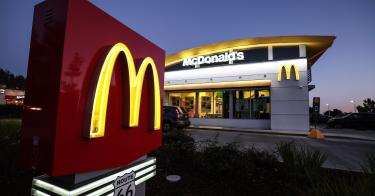California’s list of public policy failures was already long, but hiking its minimum wage to $20 an hour for fast-food workers may belong at the top. The predictable fallout in lost jobs and higher prices are already being felt, and the flood of residents fleeing the state is poised to accelerate.
The Golden State is already home to some of the highest taxes and costs of living in the country, the consequences of failed government policies. A higher minimum wage is more of the same.
Consider California’s “green” energy policies that have created the highest utility rates in the nation. Instead of rolling back those mandates, it’s created a new one: surcharges on utility bills, making the middle class pay more, even if they don’t use more.
The overtaxing, overspending and over regulating by the government in Sacramento has turned the state into such a basket case that 1.2 million more people left California than moved in over the last three years—by far the biggest loss of any state, beating New York by 35%.
Californians clearly don’t like the effects of these policies, but they just got more of them with the higher minimum wage law for fast-food workers. This particular policy provides a superb example of how disastrous economic ideas become law: wonderful rhetoric, terrible results.
>>> 1,200 Pizza Hut Drivers Among First Victims of California’s $20 Minimum Wage Folly
The law was advertised as forcing “greedy” corporations to pay workers a “living wage.” But businesses are not charities and cannot pay employees more than they produce, or they’ll go bankrupt. Employers pays taxes and other costs on top of an employee’s earnings, and at $20 an hour, many fast-food workers don’t provide enough value to justify the highest minimum wage in the country.
Not surprisingly, California’s fast-food companies have now frozen hiring, and some are already announcing mass layoffs. This is not a small cohort of workers: California is, at least for now, home to half a million fast-food workers.
That number is already dropping and is set to plunge soon. McDonald’s has been investing millions of dollars into fully automated restaurants and opened the first of such stores last year. Jack in the Box and Mexican chicken restaurant El Pollo Loco both announced they’ll be using robotics to fully automate cooking and cashier functions.
The machines are cheaper than employing people at artificially inflated wage rates, plus the additional costs like training, payroll taxes and vulnerability to lawsuits, thanks to lawyer lobbies.
Where fast-food workers can’t be replaced, their job will effectively be outsourced. About 1,100 Pizza Hut delivery drivers are set to lose their jobs, with more layoffs announced at another restaurant chain, Round Table Pizza. Consumers will have to use food delivery apps (also being targeted by California’s notorious Assembly Bill 40), or they’ll have to pick up their orders themselves.
Apologists claim that corporations are just posturing and won’t really lay off thousands of workers. That thinking is largely made possible by the fact that many politicians have never run a business, had to make payroll or hired minimum-wage workers.
>>> Biden Rule Threatens To Throw Independent Contracting Into Disarray
In short, they don’t understand the impact of the policy they’re pushing. All the politicians know is that it’s a reliable vote winner, even if it throws low-wage workers under the bus—not once, but twice.
Hiking the minimum wage causes job losses, but it also increases prices. Because lower-income folks disproportionately eat at fast-food restaurants, they bear the brunt of these higher costs, in addition to losing their jobs.
A minimum wage of $20 an hour is really a state ban on any job that pays less than $20. Californians in that category must either go somewhere else where such work is still legal, work illegally “under the table” or rely on welfare.
But the insanity doesn’t end there. The law also creates a Fast-Food Council that can raise the minimum wage for fast-food workers by another 3.5% per year, every year, until there are no fast-food workers left standing.
California will continue to hemorrhage people, and that rate of outmigration will likely accelerate as politicians target low-income workers with wage mandates and inflation. Eventually, all the people willing to work will leave, and the only ones left will be those on the state’s bloated welfare rolls.
The Golden State is killing the goose that laid its golden eggs.
This piece originally appeared in Fox Business




